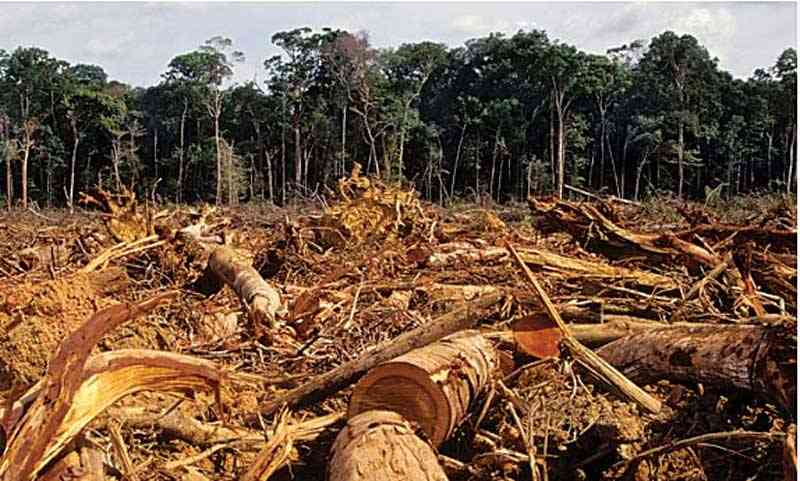
Deforestation on a global scale is accelerating yet forests are key ingredients for sustainable human livelihoods. Forest destruction is often blamed on individual communities due to their direct interaction with forests for resources, but not much has been attributed to State actors as main drivers of deforestation. Governments contribute to deforestation through agriculture, State logging, mining and construction and through the implementation of national programmes.
The above stated activities fall under agriculture, forestry and other land uses (AFOLU) of which the government is the main driver. While the government, through its departments of environment, climate, forestry, agriculture and local government, is at the forefront of publicising environmental stewardship, it has never acknowledged its negative footprint in directly or indirectly accelerating deforestation.
The main threat to AFOLU is deforestation, in which local communities and the government are guilty participants. While many people depend on forest resources for their livelihoods, the government has its equal share through State-sanctioned projects such as road construction, mining, agriculture and logging, among others. Whenever deforestation is talked about, the State should factor in its percentage of destructive footprint, in its attempts to limit emissions from deforestation and degradation. While national programmes are key to development and not reversible or negotiable, deforestation resulting from these programmes will remain deforestation, whether by government or local communities.
Emissions realised through State-sanctioned programmes and local communities’ hand in deforestation lead to climate change with devastating impacts on forestry, tourism and biodiversity sectors, no matter how insignificant the percentage is. Where the government participates in national projects leading to deforestation and land degradation, it should be its primary mission to factor in the reforestation concept so that both the lost trees, vegetation and degraded landscapes are reclaimed. The implementation of land reclamation is yet to be realised, although it is firmly documented in the government’s blueprints.
Talk about environmental stewardship is taking place in government circles but it is cheap as it is easier said than done.
The country needs more land for agriculture to feed its citizens but there are losses of trees in the process, through tobacco farming especially as it is still using curing methods that use firewood. Therefore, efforts to establish woodlots to reclaim the lost forests and improve carbon sinks are still vital. While rural communities derive almost 90% of their total energy requirements from wood fuel of which 15% is said to contribute to forest depletion, it is not clear what the percentage of the State’s forest depletion is but it has its share as well.
It is also in the public domain that both government and local communities require timber and non-timber products such as wood, timber (hard or soft), fruits, fodder, charcoal, building material, among others. Therefore, it is necessary to regulate such practices to maintain the health of our natural capital.
The natural role of forests is under threat from our uncontrolled needs and desires which the government, through its departments, should be in the forefront in taking stock of.
- Outrage over release of cable-thieving cops
- PR & communications: Seven reasons why internal communications is important
- SA delegation calls for Musina/Beitbridge synergies
- Cops arrested for conning ICT perm sec
Keep Reading
The forest sustainability and value chains should equally strategically situate all concerned stakeholders so that each role is complemented in the chain to add value and deconstruct blurred communication roles. State-sanctioned logging has always been there but there should be monitoring mechanisms within the systems to avoid bleeding the country of its natural resources. Most of the hardwoods and granite rocks are exported and the country needs them back again as quality finished products but they will be beyond the reach of many deserving cases.
The role of communication for public awareness is essential in this regard, in the interests of both the government and local communities to reduce emissions from deforestation. This is significant in facilitating timely and accurate information regarding forest cover changes and providing updates on unfolding forest losses, as monitoring tools. Although local communities derive most of their livelihoods from forest resources, they need continuous education so that they are part of the intrinsic value chain. Local communities’ participation in sustainable forest management is vital as they need some ownership including strengthening their understanding of the impact of land use changes and attempts to protect forest resources at their disposal.
Forest and forest product sectors need to communicate effectively, especially in a reciprocal way including both locals and the government.
Communication is instrumental in resolving the deforestation question and providing solutions to forest governance issues. There should be an essential and holistic exchange of forest-related information among the communities and between communities and government departments.
This is critical in maintaining a healthy forest repository spelling out tree species under threat.
Within every system, forest management system included, there are leakages which can render the whole process ineffective and ungovernable.
These are local and international leakages contributing to lack of forest stewardship and ecological governance. Issues of carbon trading, although essential, are not yet firmly in the public domain hence not very much clear to forest users and stakeholders concerned. These should also form part of education, communication and awareness for resilience building exercises. Unchecked and unregulated forest management by locals, government and international drivers of deforestation put pressure on the existing forests, therefore, sustainable interactions are always key.
It is significant that nations should strive to address the national drivers of deforestation and come up with the ease of doing forest management. Large-scale forest users need continuous education, communication and awareness while the government needs to publicise its deforestation activities as an equal participant in deforestation.
Peter Makwanya is a climate change communicator. He writes in his personal capacity and can be contacted on: [email protected].










